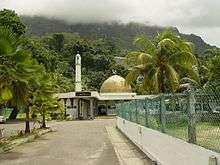Please tell us which country and city you'd like to see the weather in.

Islam in Seychelles
Islam in the Indian Ocean was established by Muslim sea merchants well before the European discovery of Seychelles. However, unlike in other island states including the Comoros and Maldives, there were no permanent inhabitants in Seychelles until the French settlement in 1770. Today, the Muslim population of the islands is reported to be only 1.1%, roughly 900 people. Many of its island neighbors in the southern Indian Ocean, including Comoros, the Maldives and Zanzibar, have a much larger Muslim influence because of their colonization by Muslims, before European colonization. Mauritius also has a much higher Muslim population due to the importation of labour from British India on a scale not seen in Seychelles. The government of Seychelles allows 15 minutes of religious broadcasting every Friday for the Muslim community.
References
External links

Seychelles
Coordinates: 4°35′S 55°40′E / 4.583°S 55.667°E / -4.583; 55.667
Seychelles (![]() i/seɪˈʃɛlz/ say-SHELZ; French: [sɛʃɛl]), officially the Republic of Seychelles (French: République des Seychelles; Creole: Repiblik Sesel), is an archipelago in the Indian Ocean. The 115-island country, whose capital is Victoria, lies 1,500 kilometres (932 mi) east of mainland East Africa. Other nearby island countries and territories include Comoros, Mayotte, Madagascar, Réunion and Mauritius to the south.
i/seɪˈʃɛlz/ say-SHELZ; French: [sɛʃɛl]), officially the Republic of Seychelles (French: République des Seychelles; Creole: Repiblik Sesel), is an archipelago in the Indian Ocean. The 115-island country, whose capital is Victoria, lies 1,500 kilometres (932 mi) east of mainland East Africa. Other nearby island countries and territories include Comoros, Mayotte, Madagascar, Réunion and Mauritius to the south.
Seychelles, with a population of 90,024, has the smallest population of any independent African state; however, it does have a larger population than the UK overseas territory Saint Helena, Ascension and Tristan da Cunha.
History
The Seychelles were uninhabited throughout most of recorded history. Some scholars assume that Austronesian seafarers and later Maldivian and Arab traders were the first to visit the uninhabited Seychelles. The earliest recorded sighting by Europeans took place in 1502 by the Portuguese Admiral Vasco da Gama, who passed through the Amirantes and named them after himself (islands of the Admiral). The earliest recorded landing was in January 1609, by the crew of the "Ascension" under Captain Sharpeigh during the fourth voyage of the British East India Company.
Podcasts:
Seychelles
ALBUMS
- Nananenen released: 2008

